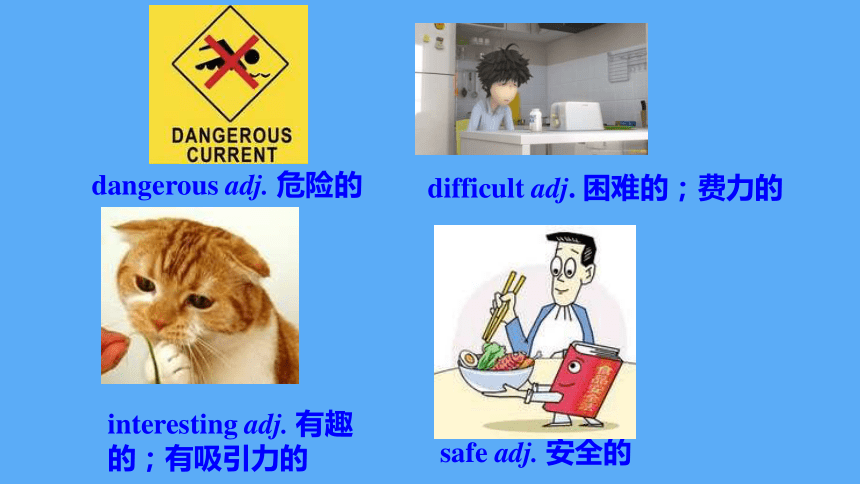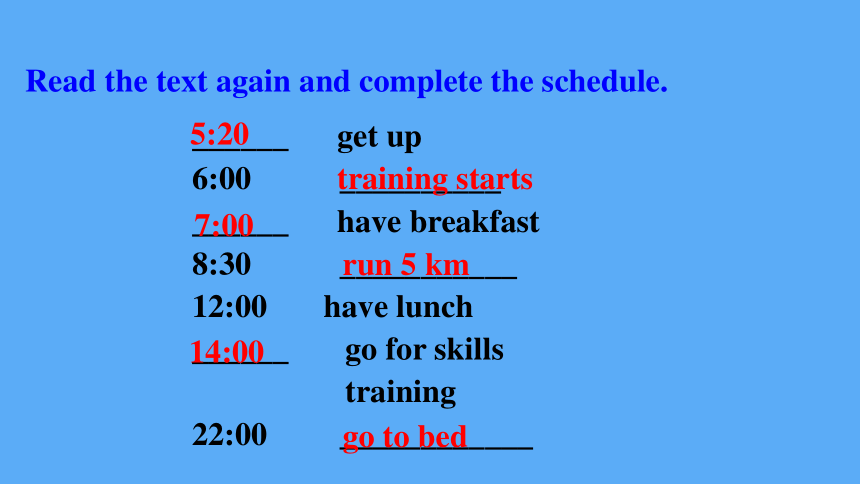北师大版七年级英语下Unit 1 Daily Life Lesson 2 A dangerous job 教学课件 (共21张PPT)
文档属性
| 名称 | 北师大版七年级英语下Unit 1 Daily Life Lesson 2 A dangerous job 教学课件 (共21张PPT) |

|
|
| 格式 | zip | ||
| 文件大小 | 1.8MB | ||
| 资源类型 | 教案 | ||
| 版本资源 | 北师大版 | ||
| 科目 | 英语 | ||
| 更新时间 | 2020-02-06 00:00:00 | ||
图片预览









文档简介
(共21张PPT)
fire n. 火;火灾
firefighter
n. 消防员
training n. 训练;培训
drive v. 驾驶,开车
dangerous adj. 危险的
difficult adj. 困难的;费力的
interesting adj. 有趣的;有吸引力的
safe adj. 安全的
What do you think a firefighter’s job is like? (e.g., Is it interesting?)
Key Words: Adjectives
boring, dangerous, difficult, easy, important, interesting, safe
Example:
I think it’s dangerous.
Read the text and put the numbers in the blanks. Then listen and check.
3 5 39 911
Keys: a. 39; b. 5; c. 3; d. 911
Read the text again and complete the schedule.
______ get up
6:00 __________
______ have breakfast
8:30 ___________
12:00 have lunch
______ go for skills
training
22:00 ____________
5:20
training starts
7:00
run 5 km
14:00
go to bed
Read the text again and complete the schedule.
______ get up
6:00 __________
______ have breakfast
8:30 ___________
12:00 have lunch
______ go for skills
training
22:00 ____________
5:20
training starts
7:00
run 5 km
14:00
go to bed
Read Paragraph 1 and answer:
1 : How many people are there in Jim’s room?
2: When do they get up every day?
3: What does he think of tidying his room?
4: What do they do at 6:00 am?
5: How many firefighters are there in his team?
Eight firefighters.
At 5:20 .
It is boring, but he has to do it.
Training starts with team exercise.
39 firefighters.
Read Paragraph 2 and fill in the blank:
One hour ______, Jim ______ breakfast. He _______ ______ eat very fast because he ________ have ________ time. Then he ______ at 8:30 in the morning. He always _______ 5 km. It is not ______ at all.
later
has
has
to
doesn’t
much
runs
runs
easy
Read Paragraph 3 and answer:
1. What does Jim do after lunch?
2. What does he do at 14:00?
3. How many skills does he practise? What are they?
4. What does he do after dinner?
5. When does he go to bed?
He gets some rest.
He goes for skills training.
3 skills : driving, firefighting
and communicating.
He has some free time.
He goes to bed at 22:00.
Read Paragraph 4 and translate:
1. Well, this is our life when things are fine.
2. If there is a fire or someone calls 911, we
have to stop everything and get out fast.
3. We must try our best to keep everyone safe.
4. Things can be dangerous and difficult, but
I think I have an important and interesting
job.
好吧!这就风平浪静时我们的生活。
如果有火灾或有人打911报警,我们必须停止一切活动并迅速出发。
我们应该尽全力去保证每个人的生命安全。
虽然我的工作可能很危险而且艰苦,但我认为我拥有一份重要且有趣的职业。
1. It is boring, but we have to do it. (收拾房间)挺无聊的,但是我们不得不做。
have to do 不得不做……,必须做……。
e.g. I have to get early every day.
我每天都得早起。
We have to drive on the right in
China. 在中国,必须靠右侧行驶。
2. At 6:00, training starts with team exercises.
六点钟,训练以小组练习开始。
start with 以……开始。
e.g. Our English class often starts with
an English song. 我们的英语课经常
以一首英文歌开始。
3. We must try our best to keep everyone safe.
我们必须尽最大的努力,确保所有人安全。
1) try one’s best to do sth. 尽某人最大的努力去做某事。
e.g. I must try my best to help him.
我必须尽最大努力帮助他。
2) keep+名词+形容词,意为“使……保持某种状态”。
e.g. We must keep our classroom clean.
我们必须保持教室清洁。
This coat keeps me warm.
这件外套使我暖和。
4. It’s not easy at all. not…at all 根本不,一点也不
e.g. 我根本不认识这个人。
I don’t know this man at all.
她一点都不会说中文。
She can’t speak Chinese at all.
今天他一点都不开心。
He isn’t happy at all today.
5. Well, this is our life when things are fine.If there is a fire or someone calls 911, we have to stop everything and get out fast.
When / If 引导的状语从句。
When表示“当…的时候”,其引导的是时间状语从句 。
if表示“如果”,其引导的是条件状语从句。
句式结构: 主句+ when /if +从句
= When / If +从句, 主句。
翻译时一般先翻译从句,再主句。
时态搭配一般符合:主将从现。E.g.
如果你明天有空能帮帮我吗?
Can you help me if you are free tomorrow?
Review and find:
One hour ______, Jim ______ breakfast. He _______ ______ eat very fast because he ________ have ________ time. Then he ______ at 8:30 in the morning. He always _______ 5 km. It is not ______ at all.
later
has
has
to
doesn’t
much
runs
runs
easy
一般现在时三单形式
Read aloud?the?article.
Remember?the new?words?in this lesson.
fire n. 火;火灾
firefighter
n. 消防员
training n. 训练;培训
drive v. 驾驶,开车
dangerous adj. 危险的
difficult adj. 困难的;费力的
interesting adj. 有趣的;有吸引力的
safe adj. 安全的
What do you think a firefighter’s job is like? (e.g., Is it interesting?)
Key Words: Adjectives
boring, dangerous, difficult, easy, important, interesting, safe
Example:
I think it’s dangerous.
Read the text and put the numbers in the blanks. Then listen and check.
3 5 39 911
Keys: a. 39; b. 5; c. 3; d. 911
Read the text again and complete the schedule.
______ get up
6:00 __________
______ have breakfast
8:30 ___________
12:00 have lunch
______ go for skills
training
22:00 ____________
5:20
training starts
7:00
run 5 km
14:00
go to bed
Read the text again and complete the schedule.
______ get up
6:00 __________
______ have breakfast
8:30 ___________
12:00 have lunch
______ go for skills
training
22:00 ____________
5:20
training starts
7:00
run 5 km
14:00
go to bed
Read Paragraph 1 and answer:
1 : How many people are there in Jim’s room?
2: When do they get up every day?
3: What does he think of tidying his room?
4: What do they do at 6:00 am?
5: How many firefighters are there in his team?
Eight firefighters.
At 5:20 .
It is boring, but he has to do it.
Training starts with team exercise.
39 firefighters.
Read Paragraph 2 and fill in the blank:
One hour ______, Jim ______ breakfast. He _______ ______ eat very fast because he ________ have ________ time. Then he ______ at 8:30 in the morning. He always _______ 5 km. It is not ______ at all.
later
has
has
to
doesn’t
much
runs
runs
easy
Read Paragraph 3 and answer:
1. What does Jim do after lunch?
2. What does he do at 14:00?
3. How many skills does he practise? What are they?
4. What does he do after dinner?
5. When does he go to bed?
He gets some rest.
He goes for skills training.
3 skills : driving, firefighting
and communicating.
He has some free time.
He goes to bed at 22:00.
Read Paragraph 4 and translate:
1. Well, this is our life when things are fine.
2. If there is a fire or someone calls 911, we
have to stop everything and get out fast.
3. We must try our best to keep everyone safe.
4. Things can be dangerous and difficult, but
I think I have an important and interesting
job.
好吧!这就风平浪静时我们的生活。
如果有火灾或有人打911报警,我们必须停止一切活动并迅速出发。
我们应该尽全力去保证每个人的生命安全。
虽然我的工作可能很危险而且艰苦,但我认为我拥有一份重要且有趣的职业。
1. It is boring, but we have to do it. (收拾房间)挺无聊的,但是我们不得不做。
have to do 不得不做……,必须做……。
e.g. I have to get early every day.
我每天都得早起。
We have to drive on the right in
China. 在中国,必须靠右侧行驶。
2. At 6:00, training starts with team exercises.
六点钟,训练以小组练习开始。
start with 以……开始。
e.g. Our English class often starts with
an English song. 我们的英语课经常
以一首英文歌开始。
3. We must try our best to keep everyone safe.
我们必须尽最大的努力,确保所有人安全。
1) try one’s best to do sth. 尽某人最大的努力去做某事。
e.g. I must try my best to help him.
我必须尽最大努力帮助他。
2) keep+名词+形容词,意为“使……保持某种状态”。
e.g. We must keep our classroom clean.
我们必须保持教室清洁。
This coat keeps me warm.
这件外套使我暖和。
4. It’s not easy at all. not…at all 根本不,一点也不
e.g. 我根本不认识这个人。
I don’t know this man at all.
她一点都不会说中文。
She can’t speak Chinese at all.
今天他一点都不开心。
He isn’t happy at all today.
5. Well, this is our life when things are fine.If there is a fire or someone calls 911, we have to stop everything and get out fast.
When / If 引导的状语从句。
When表示“当…的时候”,其引导的是时间状语从句 。
if表示“如果”,其引导的是条件状语从句。
句式结构: 主句+ when /if +从句
= When / If +从句, 主句。
翻译时一般先翻译从句,再主句。
时态搭配一般符合:主将从现。E.g.
如果你明天有空能帮帮我吗?
Can you help me if you are free tomorrow?
Review and find:
One hour ______, Jim ______ breakfast. He _______ ______ eat very fast because he ________ have ________ time. Then he ______ at 8:30 in the morning. He always _______ 5 km. It is not ______ at all.
later
has
has
to
doesn’t
much
runs
runs
easy
一般现在时三单形式
Read aloud?the?article.
Remember?the new?words?in this lesson.
同课章节目录
- Unit 1 Daily Life
- Lesson 1 After School
- Lesson 2 A Dangerous Job
- Lesson 3 Safety First
- Communication Workshop
- Unit 2 On the Weekend
- Lesson 4 Helping at Home
- Lesson 5 Talking to Friends
- Lesson 6 Going Out
- Communication Workshop
- Unit 3 Food and Drink
- Lesson 7 Shopping for Food
- Lesson 8 At a Restaurant
- Lesson 9 Food for Sport
- Communication Workshop
- Unit 4 Seasons and Weathe
- Lesson 10 Weather in Beijing
- Lesson 11 Weather Around the World
- Lesson 12 Summer Holiday
- Communication Workshop
- Unit 5 Now and Then
- Lesson 13 Changes in Our Town
- Lesson 14 My First Day
- Lesson 15 My Favourite Teacher
- Communication Workshop
- Unit 6 The Animal Kingdom
- Lesson 16 My Favourite Animal
- Lesson 17 Interesting Animals
- Lesson 18 An Animal Story
- Communication Workshop
